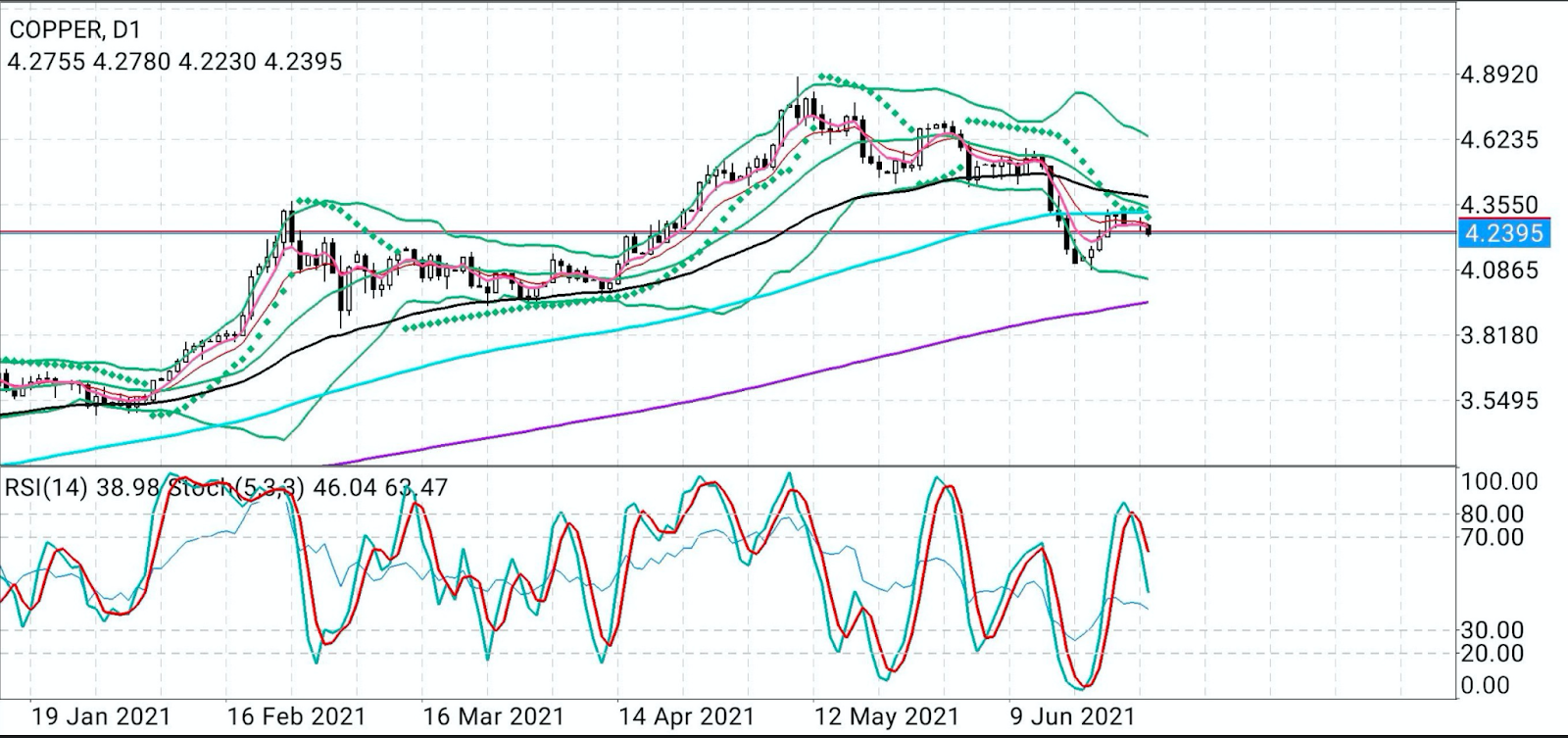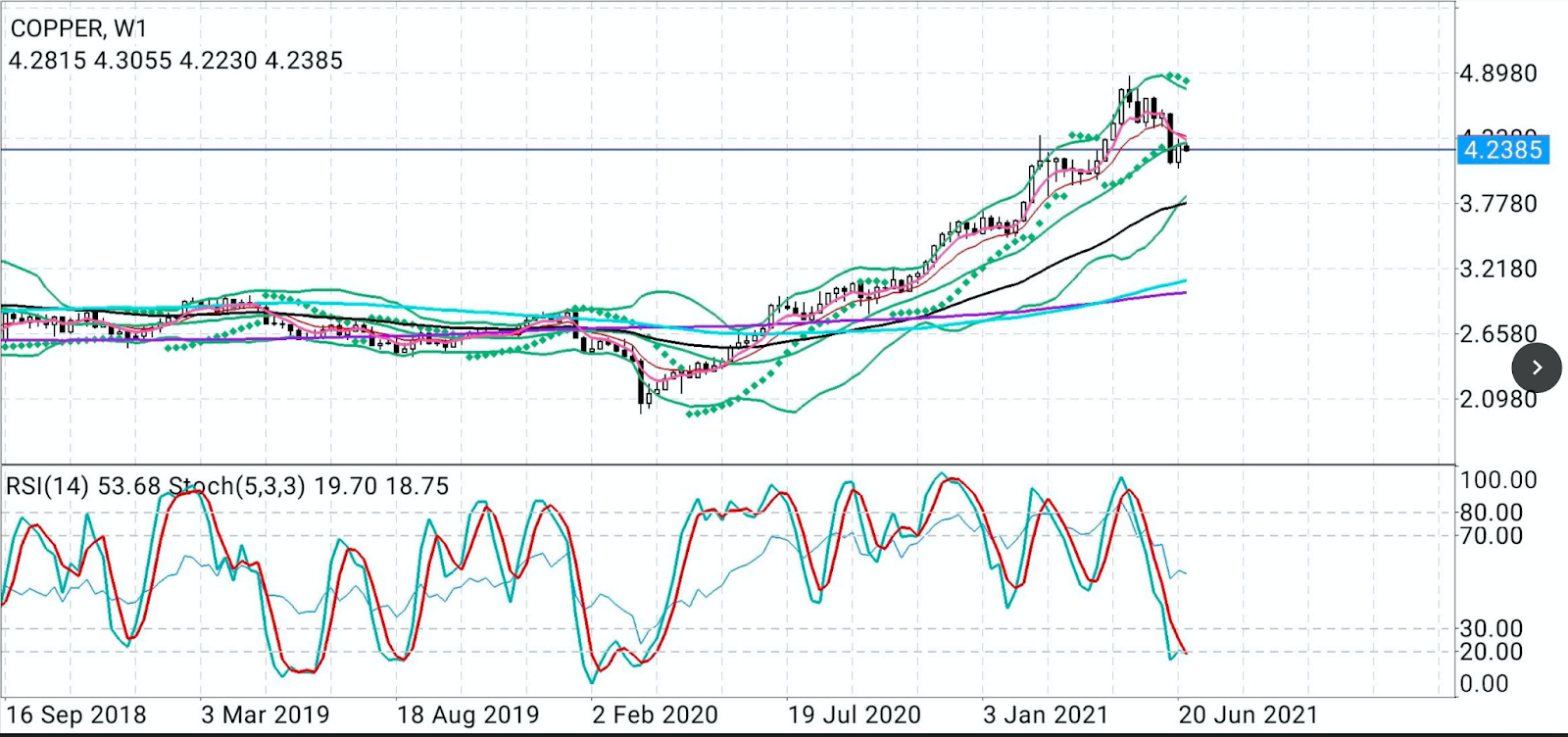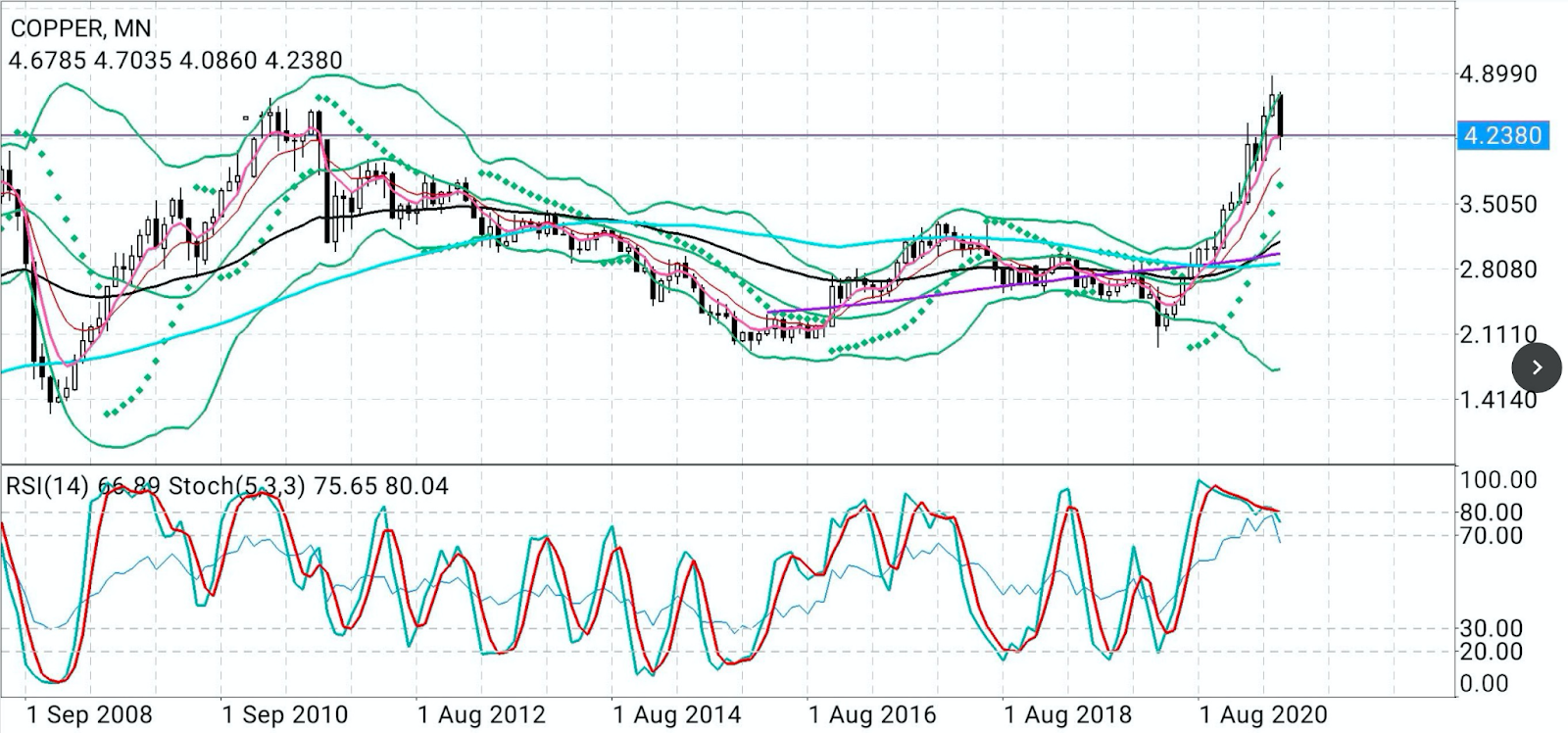As the world’s largest buyer and hoarder of commodities, China is uniquely positioned to let prices of raw materials rise when they don’t hurt its economy, and crack down on them when the opposite is the case.
We’re seeing now what this means for copper—which reached record highs in May, only to be forced into its worst correction this month since March 2020 by a Beijing determined not to be overwhelmed by inflation in the price of the number one industrial metal.
State-owned Chinese companies have been ordered to control their risks and limit exposure to overseas commodities markets, Bloomberg said in a recent commentary. In a related move, government stockpiles of copper, as well as aluminum and zinc, will be released to fabricators and manufacturers in order to clamp down on prices of these metals.

All charts courtesy of S.K. Dixit Charting
Some 20,000 tonnes of copper are to be publicly auctioned on July 5-6 in the first round of an unusual release of stockpiles from Beijing’s National Food and Strategic Reserves Administration. China has also been shipping domestically available copper to overseas destinations, in an attempt to dampen international prices as well. Chinese copper exports rose for the third month in May to the highest since March last year, data showed.

The impact of all this is a 9.5% drop in copper futures traded both on the LME, or London Metal Exchange, and New York’s COMEX.
At Tuesday’s pre-open in London, LME was a touch below $9,295 a tonne, versus the May-end settlement of $10,275 and May 10 record high of $10,746.
COMEX copper was at $4.23 per lb versus last month’s close of $4.68 and the May 10 all-time high of $4.89.
The last time copper lost that much in a month was in March 2020, at the outset of the coronavirus pandemic, when it dropped almost 12%.
May’s record highs in copper were the last straw for China as manufacturers began trimming down operations to reduce stifling operations costs. The increasing gap between Chinese Producer Price Index and Consumer Price Index showed many manufacturers stuck in the middle, bearing the brunt of rising costs.
Producer prices rose 9% from a year earlier in May, their fastest pace since 2008.

Treatment charges that Chinese copper refiners demanded for turning concentrates into metal hit a record low of $30.54 a ton in April, suggesting that margins were being compromised to get product to consumers.
The current scale of China’s planned metal sales appeared enough to scare some speculative froth out of the market, Bloomberg said in a mid-June report.
It added:
“The size of Beijing’s strategic metal stockpiles is a closely guarded secret, so anyone buying on the hope of rising prices is facing a seller who may well have an unfathomably large warehouse of metal to keep levels suppressed.”
But even so, there’s plenty to suggest that China’s metals demand is so fundamentally strong that keeping prices lower for longer would be a hard task.
Over the three months through May, Chinese fixed asset investment in infrastructure ran at nearly three times the levels of a year earlier—far in excess of anything ever seen, the report noted.
Trading Economics also concluded that China’s attempts to wear copper prices down over the long-term might not work well, saying despite Beijing maneuvers’, the metal hasn’t exactly collapsed due to global recovery spending by governments all over the world.
The New York-based research outfit added:
“Losses have been limited by trillions of economic stimulus to support post-COVID recovery including funds for infrastructure and for transition to a carbon-free world, which (has) boosted demand.”
“At the same time, lack of investment by big mining companies and a slowdown in production during the height of the COVID outbreak last spring brought inventories to levels not seen in fifteen years.”
In the near-term though, Investing.com’s Daily Technical Outlook is maintaining a “Strong Sell” on the metal, showing that LME copper could fall to between $9,280 and $9,216 a tonne, and COMEX copper to between $4.251 and $4.196 in the near-term.
Under our “Fibonacci Technical” model, LME copper’s support is forecast to begin at $9,354, then move to $9,326 and later to $9,280. For COMEX copper, the range is $4.258 first, then $4.245 and finally $4.224.
Under our “Classic Technical” model, LME copper’s support is forecast to begin at $9,337, then move to $9,280 and later to $9,216. For COMEX copper, the range is $4.251 first, then $4.244 and finally $4.196.
Sunil Kumar Dixit of S.K. Dixit Charting in Kolkata, India, concurred with Investing.com’s calls on copper, saying the metal was in correction mode after its modest downdraft.
Said Dixit of COMEX copper:
“Prices are trapped in a tight range of between $4.40 and $4.10. Daily Stochastic RSI, or Relative Strength Index, signals continuation of the correction, which targets 4.08 initially and is likely to extend to $3.97.”
“On the flip side, reactive up move can cause limited upside to between $4.33 and $4.41. Copper is trying to form a bearish reversal top which may cause some lasting selling before any new attempt to rise.”
Disclaimer: Barani Krishnan uses a range of views outside his own to bring diversity to his analysis of any market. For neutrality, he sometimes presents contrarian views and market variables. He does not hold a position in the commodities and securities he writes about.
